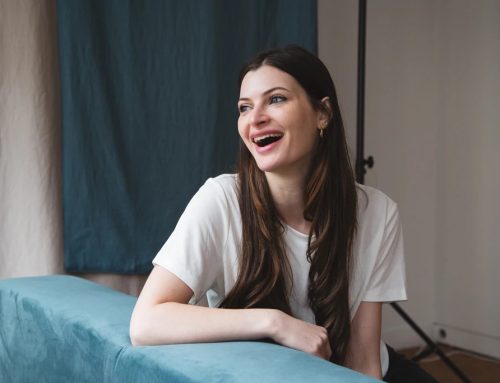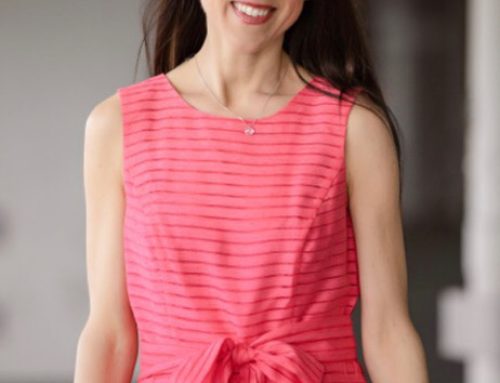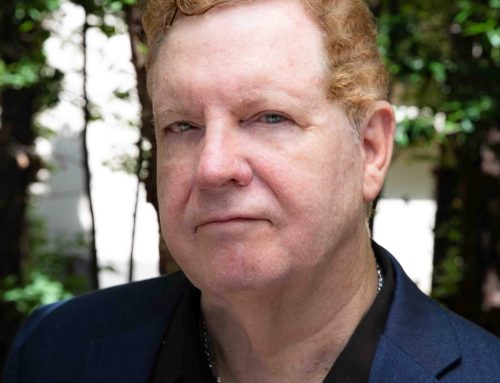Ashley: I am very excited today I have Bruce R. Ross joining me. He is an 8 time award-winning mental health advocate, as well as the author of Breaking Free of Depression’s Grip. Thank you for joining me today Bruce.
Bruce: Thank you for having me on your show, Ashley. I appreciate it.
BREAKING FREE OF DEPRESSION’S GRIP
A: Can you tell us a little bit about what your book is about?
B: The book Breaking Free of Depression’s Grip chronicles my entire adult life which is 45 plus years now and counting of the journey of living with depression as well as anxiety. It openly talks about the professional and self-help measures I have undertaken to combat the illness, what I learned, how I open up about the inner personal issues I had during the 45 years and the role of friends and family played. It’s quite an all-encompassing book. It’s kind of unique in a sense that many, if not, most depression and books are written by MDs or PhDs, and they write from a clinical or academic aspect. But my book is written from someone who’s lived at from the heart, essentially it has a message of hope. The underlying message is that despite the burden of depression for so long that a person can still do well in their family life, their career and their personal life. That’s really the underlying message of the journey.
A: I think that’s such an important message to share with people because I think when you’re in the thick of depression it’s really hard to see that there can be love and there can be positivity and there can be joy within that struggle. It’ll be so beneficial to people to be able to actually read from another human’s perspective. Sometimes when it does come from that clinical state, it can feel very dry and hard to relate to, and really find maybe that deeper connection to.
B: Absolutely. I’m very candid about both the challenges and the positives that I’ve been through in the course of my adult life. You’re absolutely correct Ashley, I don’t believe it’s dry and it’s written in everyday language so people can relate to it, but it tells the story of 45 years. Which is a long time. I’m 62 years old now. So more than my entire adult life as has been dealing with the disease so I share that journey so it’s something hopefully people can relate to.
DEPRESSION SYMPTOMS STARTED IN 1970
A: I know there is a lot more conversation and the stigma has sort of disappeared a little bit more about depression and just the awareness, but going back 45 years when these symptoms started, it must’ve been really challenging because I’m sure back then it wasn’t as easily recognized.
B: Absolutely. You hit it right on. It started when I was in about grade 10 ’bout the time puberty onset now that was 1975. So back then mental health issues were not discussed at all. Certainly not in my own household, but not in the press or media or just a general conversation like it is today. So I had no idea what I was dealing with. Unfortunately I didn’t have a relationship from my parents to talk to them. I had what I would find out 20 years after the fact in 1995, that I’ve been dealing with depression for 20 years and didn’t know anything about it. I just knew I felt a skew. I felt displaced. I felt glum all these kind of typical symptoms of depression as well as anxiety. I struggled along for 20 years not knowing what I was dealing with. In 1995 my wife came to me when during a particularly glum period and told me, she said Bruce I think you suffer from depression and that’s what started the journey with doctors on self-help measures to combat the illness. So that’s been going on over 25 years now.
A: Did you go to the doctor at any point before then?
B: Not until 1995. I didn’t know. I just thought my ship had not come in in 1975 and until 1995. So that 20 year stretch, I moved three times out of province to find myself. Frankly depression, mental health did not cross my mind one bit that’s hard to believe now with all of the media exposure is getting, but back then, the only real topic I knew about mental health issues was watching the old Jack Nicholson movie, One Flew Over The Cuckoo’s Nest, a very famous movie at the time. But I knew I wasn’t one of them, so to speak that portrayed in the movie, but I didn’t know what it was. I really didn’t know. It’s hard to fathom now.
A: Back then, how media and I’m sure any time that it was in books, it really did have that stigma of people being crazy or erratic. And wasn’t really a realistic version of things. Just because you suffer with any sort of mental health problems, it doesn’t necessarily make you different or make you bad or make you how the movies or TV shows would have portrayed. When your wife did come to you and say I think it’s depression. What was your reaction to that?
FEELING LIKE EEYORE
B: Well, interestingly enough, I felt like an escaped prisoner who has been on the run and finally is in snared by the police he or she feels is that some sense of relief in a sense sentence over. That’s how I felt. I wasn’t defensive when Cheryl mentioned it, I was actually relieved that I finally had a label to my illness. I was very receptive to it. I went to my family doctor and it was very overcrowded clinic and he was behind schedule as per usual. I told him how I felt within five minutes of my conversation with him, he diagnosed it as depression. He didn’t label what type of depressed. He just said it was depression prescribed Prozac, which was the wonder drug back then. Prozac didn’t work so that sent me on the trail on a journey of 45 years of searching 25 years, I should say.
A: I think that’s important to mention, is that depression isn’t a one mold fits all that. There is different types of depression and I’m sure different layers of depression.
B: Yeah, there’s probably six or seven types of depression that are defined. I have two of them. One is a most people have never heard of but it’s called Persistent Depressive Disorder, which is a kind of low grade depression where you feel bummed out every day, really is for lack of better word. Probably the best analogy is think, Eeyore the Winnie the Pooh character, kind of has a dark cloud over his head is always down very pessimistic and negative and so forth, but as able to cope with life, able to deal with life, but there’s not a lot of joy. So that’s how I felt for years then when I tried all these options for treatments that really weren’t successful, I became quite discouraged and dipped into major depression, which is what most people relate to when they think of depression. So I’d been there where you have suicidal thoughts and you give up hope and that type of thing. So I have the two of the seven major categories of depression that people are familiar with.
POSITIVE AND NEGITIVE EXPERIENCE WITH TREAMENTS
A: Can you tell us about some of the things that you did try for yourself that weren’t successful and some of the things that were successful?
B: Yeah, well, it’s a good question. It’s pretty well one side is the fact of that he didn’t work. The professional measures since 1995 until today, I’ve tried over 20 different medications. So many of that I’ve actually lost count now, but I know it’s over 20 last time I checked. They haven’t been particularly successful except for one, which I switched to last year. I’ve also been to various sessions of Cognitive Behavioral Therapy. CBT is the acronym pretty standard treatment for depression where you talk to a psychologist or psychiatrist or other therapists who delves into some than the negative, or skewed thoughts you may have of the world to try to get you to see a better, more positive views of the world. So I tried that a number of times, different sessions, but although I understood from a logical basis that didn’t really translate into a practical or emotional state. So CBT really didn’t work. I tried ECT, Electroconvulsive Therapy, which has a bad reputation because the movies, the jist is the doctor puts you under with anesthesia hooks up wires in the front of your forehead and jolt a little bit electricity into your brain. The electricity is supposed to jolt you essentially out of the depression. I was supposed to have 18 daily treatments, but my doctor stopped it at the end of 10 because I wasn’t receptive to it. I wasn’t responding. Ketamine was most recent option that I’ve tried. Now ketamine’s a drug that was been popular since the 1960s as a kind of a hippie drug apparently, and then most recently abused as a date rape drug, but when used respectfully, then it’s shown great promise for treatment of depression. In fact, it was on the cover of time magazine a couple of years ago, as the most promising treatment in years. When I tried it, it was administered intravenous being asleep at the hospital. There was no veil, it really didn’t help. Another professional measure, I’ve taken what was the kind of the granddaddy of them all and that was called Deep Brain Stimulation, which most people are probably aren’t familiar with. People are familiar with the pacemaker for the heart. So think of this as a pacemaker for the brain. What the doctors do, and it was taking place in Toronto at the Toronto Western Hospital where the surgery occurred about 10 or 12 years ago, they drilled it into my skull, two holes into my skull, insert metal electrodes into my brain and then inserted the battery in my chest, then hooked it up with a wire and turned it on essentially. A jolt of electricity periodically are supposed to stimulate you out of your depression and you know, much to say might as a pacemaker for the heart stimulates the heart. So it’s really the same type of thing. This was research conducted. I was actually researched candidate number one, but it didn’t really help. So I still have the pacemaker in my chest and the electrodes in my brain but they aren’t turned on. They’ll be with me till the day I die. So those are five professional messages I’ve been through. I’ve been through others, but that won’t go in detail. I’ve been through self-help measures. I didn’t just sit on my butt waiting for the doctors to solve my disease. I read a number of self-help books especially when I was first diagnosed but self-help books were kind of like books on how to play better golf. You kind of know what you’re supposed to do, but it doesn’t translate into the real world.
I did find since 1995 that my education has helped me relieve some of the depression. So that was a bonus. I have obtained my accounting designation, my financial planning designation, and my MBA at age 55. So that was a self-help measure that kind of helped, but a bit like taking an aspirin for a migraine headache. It really didn’t solve the problem, but relieved at somewhat. I always read that exercise helped relieve depression so I took that to the extreme and when I was 38 years old I started training. In five months I ran my first of five marathons, completing all five of them in pretty good time. When that wasn’t enough, then I escalated to triathlons. One summer when I was almost 42 years old, I ran three high-level triathlons, including a half iron man triathlon. If you’re not familiar with triathlons, that’s swimming, biking, and running in consecutive order. Quite demanding. But after that, I gave up on the exercise, it helped somewhat, like I said, the aspirin for migraine, but it wasn’t a solution. The other self-help measures I took was writing my memoir: Breaking Free of Depression’s Grip. I had heard that if you have thoughts in your mind, and write them on paper, relieves the stress and the depression. So I did it for therapeutic reasons and it did help. Again, it wasn’t the solution to the problem, but it did help. So that’s kind of a brief recap I could go on for hours, but I won’t for the sake of time, but anyway, you get the picture.
A: I think that is really great and also really frustrating that it isn’t as easy to fix as, you know, being able to run a triathlon, which that is amazing for you because I am almost 40 and I don’t think that I could run around the block. I also do think sort of the plus side of maybe having all of these avenues to try, because like you said, 20, 30, 40 years ago, none of those potentially would have existed. I do think it’s really important for people to understand that if they do struggle with depression and you do feel like I’m trying all these things and it’s not working, that it really isn’t you, it really is just finding the right chemistry of something that’s going to help you. But it doesn’t mean that there’s something wrong with you or it doesn’t mean something bad if running isn’t your thing or writing, isn’t your thing. Medications are tricky. Back in the day, there used to be those infomercials where it would say it’s going to cure this and then show you 70 others side effects. I would imagine that medication with depression is finding the things that aren’t going to make it worse or not going to make the quality of life worse while also trying to help you. What did your depression look like for you?
WHAT DID YOUR DEPRESSION LOOK LIKE?
B: Well, certainly the number of the typical characteristics of depression. Certainly there was the overall depressed mood feeling, glum just no interest in doing any social activities. Probably the big thing was I didn’t felt as if I didn’t belong in society in the group. That was very difficult. Poor concentration, low self-esteem fatigue so those are some of the physical traits. The one thing I didn’t incur was the loss of hope until I succumb to deep depression, to major depression, but for the most part, I could cope with life, get along, put on a facade, kind of like a clown does putting on the face or comedian does by making people laugh and, and living day to day. But there really wasn’t any joy it was just an existence. It was as if I was missing a joy gene, if there is such a thing, that’s the way I felt for so long. Cheryl, my wife and I went to see Jay Leno and Jerry Seinfeld in concert a number of years ago. I still remember leaving the theater and thinking to myself, I’ve just seen two of the funniest comedians in the world and yet I really didn’t find any contentment with that or happiness or whatever. It was just it was kind of a tough frankly.
A: I can only imagine the feeling that in a sense that you’re trapped in your own body and that everybody else is getting to experience something that you don’t experience. When you did have the answer that it was depression and that it wasn’t just you, did you end up having conversations with your family about it afterwards and saying I’ve had this for 20 years just FYI.
B: Well, yes and no, but it really was never a comfortable conversation. It was never a warm and friendly conversation. It was just a matter of fact. As I said at the start, I never had a great family relationship with my parents and I have two brothers too, and it’s not probably the greatest there we just didn’t share a warmth so I told them that I had depression for 20 years, but it was just more of a very robotic type of conversation, just almost just factual without any emotion attached to them. Unfortunately, my parents passed away a couple of years ago. I never really reconciled with them. I feel a little bit of a disappointment in the sense my mother had a degree in psychology and was a registered nurse. I felt some disappointment that if anybody should recognize an illness it would have been her. She was so oblivious. Like everything was fine in her mind and it wasn’t. My father is very negative and pessimistic and very unsupportive of any initiatives I did so it was just very difficult. I never really did open up with them other than factually.

NOT REPEATING GENERATIONAL TRAUMA
A: Which I guess something that you would have been able to take the opportunity to do different with your own children?
B: Well, I hope so. We have our own daughter, Hannah, who is 21 years old. My biggest worry about her is that those genetic link with depression and that she will succumb to the illness. She hasn’t shown that propensity yet, but that’s good, but I certainly leave a open door for her to talk. Interesting enough, she’s actually in the psychology program at university with the intent of going on to the mental health field. I’m sure that’s direct influence of my life and although I haven’t tried to display or to push her to do that, that’s a choice she wants to do so power to her, but that’s my biggest concern is that she’ll be afflicted by the disease. No question.
A: If it was to happen now in this day and age versus your generation, at least there isn’t that stigma to come forward, whether it is in a workforce or whether it’s an old family life of saying I have depression, I’m suffering and have the resources if that came to it. I also think that her leaning into psychology would be a testament of how much she loves you and loves your family. Thinking about anxiety or depression, are there any myths that you would like to sort of see dispelled?
DEPRESSED PEOPLE ARE NOT NECESSARILY DANGEROUS
B: I think probably the biggest one is probably that depressed people are dangerous. They’re not, unfortunately, out of those seven types of depression there is one type psychotic depression where you hear voices and have hallucinations and those are quite often associated with the notably in the United States, with the gunman who go on a rampage. That’s unfortunate that other depressed people get labeled the same way. That’s certainly not the case. I actually never been in a fist fight in my life. So I think the myth that we’re dangerous, the people with depression are dangerous, are kind of scary. That’s unfortunate because that’s not the case. That’s probably the big one.
A: I think it is really unfortunate how has the media and movies in general do portray people that they almost enhanced the stigma in a sense of what mental health really looks like. I think depression can hide behind so many faces. You could look at somebody and never really necessarily know that that’s something that they suffer with versus being some erratic person.
B: It’s interesting because people have asked me are surprised that I’ve had depression for so long, because I’m pretty good natured and I covered up apparently quite well, but the analogy I had often you hear somebody who’s going to get a divorce or separate from their spouse. You’re kind of shocked to hear that because you think to yourself, I never knew anything was wrong. It was the same mental health. You can really conceal it and the other analogy would be for those people who’ve had too much to drink and are frankly are hung over the next day. You know, you don’t feel very good. You’re not inspired. You just want to go back to bed, but you can force yourself to go to work or wherever socialize if need be, and most people only know you’re hung over because you can conceal how you feel very well. And that’s with depression you can, do it. The big example as Jim Carrey the Canadian comedian, who he was on 60 minutes sometime go and open about his depression and how use comedy to kind of counteract , the depressive symptoms. So it was kind of, surprising to see comedian share that he had depression.
A: A lot of comedians talk about their struggles with it and how they use comedy kind of to hide behind that as their shields. I think sometimes when it comes to depression and anxiety, it almost feels louder in our head and within our own bodies, versus showing signs of not being able to get out of bed or crying, or physical symptoms, then it would be really hard to potentially go to work or go to school. You’ve shown that you’ve been able to do all of those things. So I think in just thinking about obvious signs, that that’s really not always the case.
POSITIVE SIDE OF BRUCE’S DEPRESSION
B: No, that’s right. It’s interesting. Just kind of along that line is it’s hard to imagine that there are some positives of depression, but in my case, there has been some. I almost don’t want to admit that, but I I’d like to think I’ve accomplished quite a bit in my life with the triathlons and marathons and the education and visit all 50 states and 10 provinces and so forth. The question is would I have achieved those feats, those goals if I didn’t have depression? And the answer is probably not because I would have been content with my life, content with who I was, and wouldn’t have been looking to achieve our objectives, to feel better about myself. I would have been content with who I was. So it’s just kind of interesting phenomena, but how it kind of does have a benefit though. You know, I wouldn’t promote that too heavily because the nature of the illness, but it’s interesting.
A: I definitely think that it’s okay to find positives within the struggle. It’s amazing to be proud of those accomplishments, whether it’s something that depression was what was pushing you to potentially do those things. Going back to when you were diagnosed with depression, sorry, what age were you again?
GETTING AN EDUCATION AND FINDING A CAREER
B: Grade 10. I probably fit 14/15.
A: That must’ve made finishing school or going through school really challenging.
B: It was extremely difficult through high school and university. I couldn’t concentrate. I got through and partly I think, because I’m blessed with a fair amount of intelligence. So I got through, but no stellar marks and they kind of came back to haunt me years later when I tried to get into advanced programs, post secondary education programs. They looked at my marks, so high school or undergraduate marks and said, no, we can’t accept you. I thought that was unfortunate, but I understood. It was interesting in my late twenties, I did concentrate on education. I really delved a lot of time into it. I actually started to excel at courses through my accounting designation and so forth so that really made me feel better. So that was kind of self fulfilling motion that I continued and I’m a big education proponent today, but it was very much a struggle in the early days of high school. And in the first go round to university. No question.
A: Did it make finding a job challenging at all?
B: It made a extremely challenging I had zero self-confidence, zero self-esteem. I just didn’t have a lot of good feelings, but confidence going into an interview when I did get an interview, I just felt as if I wasn’t up to the task, that I wasn’t on par with the employers, whether or not I fit in or be able to do the job I just felt inferior frankly. So it was extremely difficult and as a result, I took a number of low level jobs, that I kind of regret but I had no choice. I just that’s the way it was.
A: Did you end up finding a job or career that you ended up loving or something that you really felt was a better fit for you after taking those low level jobs?
B: I did. I ended up finding in the financial sector, a job that I stayed with for 32/33 years. I just retired a couple of years ago. It was very comfortable because there wasn’t under a lot of pressure from the employer. I could work on my own for the most part, kind of back room, the back end in the financial aspect. So I felt kind of a sense of comfort because I didn’t have to expose myself to the big wide world, essentially with social activities and so forth. With a lot of jobs that you have to entertain or be seen, I was allowed to kind of just work at my own pace and do my own thing. So I kind of lucked out, in that respect, kind of got me through for sure.
A: Are there any changes that you would like more workplaces to put into effect as far as mental health considerations go or what would be some benefits that you would see offices make in today’s day and age?
B: That’s a tough one. I was fortunate enough to have a CEO, who’s very compassionate and very understanding of my situation. I really didn’t have to deal with the employer aspect, but for some employers, that can be a bit of a challenge because they’re really not as understanding or appreciative of the fact that depression is truly a physical illness. I would like to see more, certainly more education, more understanding by employers to recognize that it’s a serious of an illness as cancer or diabetes. Until that happens I’m not sure we’re going to progress to the stages we want to, but things are getting a lot better. Thanks to, for example, Bell’s Let’s Talk campaign and the media and press in general have been very open about mental health issues. The only complaints so to speak, I have is the commercials to see on television. They’re very vague and kind of abstract. They really don’t tell you anything other than, if you think you have mental health issues, see your doctor, really not particularly enlightening as to what the disease is all about.
DEPRESSION ISN’T LINEAR
A: There does need to be more specifics for it. I find sometimes even when you go to your family doctor, then it really is what we’ll send you to a psychologist, or it’s sort of , a run-around process that I think anybody with depression needs to kind of understand that unfortunately it’s not going to be a straight linear line. Being able to get help necessarily that it does end up being wait for this appointment and go talk to that person and then come back to me , and kind of that circle effect.
B: Yeah, I’ve heard that the frustration of people who’ve had to deal or somebody in their family has dealt with depression or other mental health issues. They see the advertisements or whatever exposure on television, but they go to call the mental health support and it’s just not there. There’s just not the resources behind the scenes so that was very frustrating. I’m sure I didn’t really have to deal with that. I’ve had a pretty good doctor who’s on top of it as best he can do. I’ve kind of been fortunate if you can call it that after 45 years.
A: I definitely think having a great doctor makes such a difference. What keeps you going now?
B: A couple of things. One is I always felt very comfortable about my ethics and integrity. Just as the same as people fall back or some people fall back on religion when times get tough over the course of the years, I’ve fallen back on the fact that my ethics and integrity I believe were pretty sound. I always felt some comfort in that. One of my biggest idols is Martin Luther king Jr. he had the quote, the time is always right to do what’s right. I believe I adhere to that quote and it made me feel better as you result it and got me through some of the tough times. Number two is friends. I don’t mean friends in the traditional sense. It wasn’t like as a social butterfly growing up or, had a zillion friends, it’s really an association logic. I have pretty solid friends from years ago and still to this day they’re good people. They like me. So that means by association, I must be an okay person so that kind of helped to get me through just reinforced who I was and gave me a little more confidence. The third thing is, no question Cheryl, who has been the absolutely rock of Gibraltar since 1995. It’s not because she coddled me or felt pity for me or looked at me as the victim, but was a role model to aspire to be like, and so she was somebody I looked up to and still to this day to, do the right thing.
A: That is so beautiful to have that person be your rock because I would imagine that depression or anxiety or issues like that could be very heavy on a marriage and in a relationship so to be able to weather it and to be able to have this long-term successful relationship, I think is really inspiring to others, especially in the day and age where most marriages are lucky if they make it five months, let alone that many years.
B: It’s interesting because the number of people that have thanked me and congratulate me for the book and speaking about it and, Cheryl kinds of kids, people that she should write a book on how, what it’s like to live with somebody who’s depressed. She has a good point.
A: I think that really would be a good book. It really would help a lot of people, because depression is so common, especially. Over the last two years, I think it’s at an astronomical high that it really would be nice to see the other parts. So maybe doing like a two part series with you?
B: Yes. It would be.
A: Well, Bruce, I really appreciate you having this conversation with me today.
B: Thank you, Ashley. Thanks for having me. I just want to finish it off by saying, the book is Breaking Free of Depression’s Grip and it chronicles my life of depression, but it has a positive message in there, but that you can succeed despite the burden of depression. My hope is to share with people there’s no morals or chores or preaching in the book. It’s simply a story of hope and that’s I think it’s pretty solid one to have having coming out of COVID and mental health issues we’ve had as a result.
A: Thank you for being brave enough to share your story with people. I really do think that the more that we talk about depression or the more we talk about these issues, the more we de-stigmafy them.







Leave A Comment